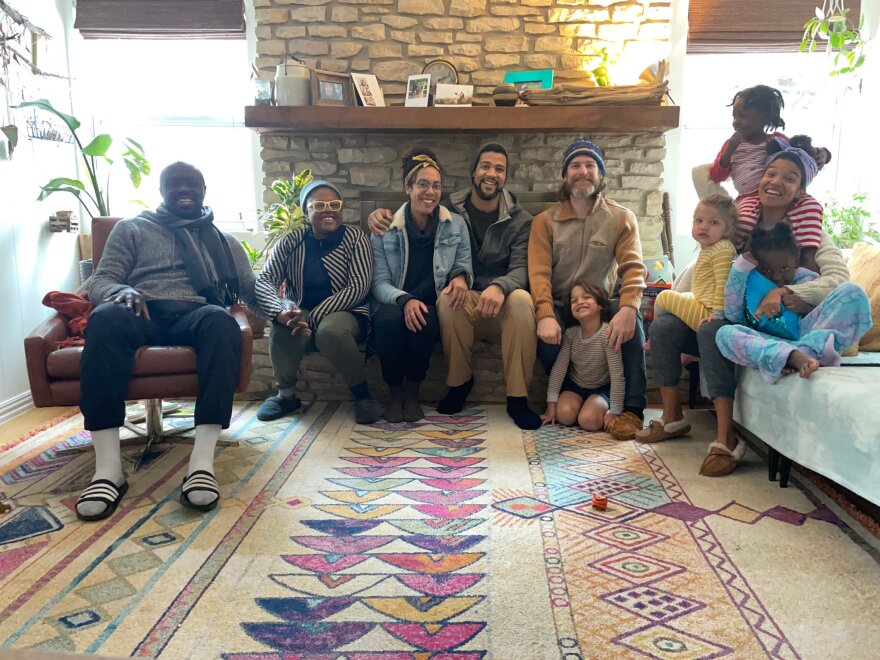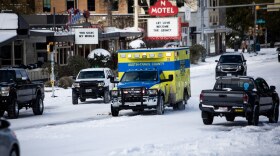Ben Lang maneuvered his maroon Subaru through icy Austin streets like a seasoned winter driver. The car, still sporting Washington plates, was packed with food: salmon, spaghetti, vegetable stir-fry and day-old pastries that Starbucks was giving away.
It was all going to neighbors without power.

“I wish there was more of a government effort to do this,” said Lang, a doctor at Dell Children’s Medical Center. "In the meantime, we can take care of each other, and feed each other and try to keep each other warm as best as we can,” he said.
His wife, Adeline Hill, had cooked up most of the food while Lang slept off a night shift at the hospital. She stayed behind with the couple’s two kids while Lang drove around delivering the meals.
Lang’s first stop on Wednesday evening was Blanca Garcia’s home. She, her husband, sister and four kids had spent three days without power, huddled in one bedroom with blankets, using candles and terracotta pots as a source of heat. At one point, the temperature inside the house dipped to 28 degrees.
“I’m really thankful, because we’re running out of food,” Garcia said. The family had resorted to eating cold rice and beans. “It’s really sad for my kiddos,” she said. “What am I supposed to tell them?”

When low temperatures took power sources offline and the state electricity company ordered “rolling” outages that turned into days without power, some people said they felt abandoned and left to their own survival skills. Neighbors who had power, like Lang and Hill, stepped up, providing their own homes, hot meals or rides to warmer places.
‘We’ve Had To Start Relying Upon Each Other’
When Brandi Prejean realized Monday that her home was one of about a dozen in her Southwest Austin neighborhood that still had power, she decided to turn the front room of her home into a warming and charging station. She grabbed all the power strips she could find, put out a bench for visitors and posted the news to her neighborhood Facebook group.
“Monday was a day of information sharing,” Prejean, who works as an attorney, said. “People were running out of power to communicate and to get information to one another.”
More than four dozen people stopped by over the last week to charge their phones or laptops. Careful to ward off any potential spread of COVID-19, Prejean provided hand sanitizer and said some people left when they felt too many were inside.
On Thursday, after much of the neighborhood lost water as well as electricity, Prejean began melting snow for her and her neighbors to flush their toilets and wash their dishes.
“As a community, we’ve just had to start relying upon each other to take care of each other,” she said.
That reliance is what has kept many fed and warm this past week. While government entities like the City of Austin opened cold weather shelters to house and feed people overnight, the city cautioned that these were only for the most vulnerable; late last week the city’s main cold weather shelter, the Palmer Events Center, reached capacity.
Meanwhile, community organizations like the Austin Area Urban League, the Austin Justice Coalition and others have been providing shelter and food. Individuals have also taken it upon themselves to do the same.

In North Austin, Lang left the Garcias’ home and made his second meal drop-off of the evening. Jasmine Vega and her son Noah, who turns two in April, answered the door of their second-floor apartment.
Vega said the power had returned just minutes before Lang got there; it was the first time in three days they’d had heat. Vega, her husband and two kids had been huddling under blankets to stay warm, telling stories to pass the time.
In another corner of her apartment complex, two men warmed their hands by an outdoor fire.
“We all have to take care of each other because there’s no other way,” Lang told Vega.
He left, headed to the third and last home on his list.
‘We’re Expected To Carry The Weight Of This’
At the beginning of last week, Shaleiah Fox felt shocked – shocked that suddenly, many of her neighbors had no electricity in freezing temperatures.
With one of the few homes still with power, Fox opened her house to two families.
“Within 12 hours of everything closing down, we had a full house,” she said.
The six adults and four kids spread out across the bedrooms and the couch. When the kids got tired of watching PBS, Fox said, they turned to crayons – but mostly the newness of the situation kept them from being bored.
By Thursday, power had been restored to the other families’ homes, so Fox was back to her family of four. But now that the shock of the emergency had worn off, she said she was left with anger.
“We’re expected to keep our thermostats low, we’re expected to conserve water, which we don’t mind doing because we realize we’re part of the community, but where is that wherewithal and that thinking at the leadership level?” she said. “We’re happy to do it but it does feel like we’re expected to carry the weight of this – again.”

Again, Fox said, because even once power has been restored – and hopefully water, too – we all continue to live through an uncontrolled pandemic.
“We’re expected to be teachers and parents and housekeepers and caregivers because our government failed us in responding to this pandemic responsibly,” she said. Fox, who is Black, said she has also had to bear the weight of holding institutions accountable for racial injustice. “It does seem to feel like the citizens are left holding the biggest bag.”
Not too far from where Fox lives, Lang dropped off the last warm meal to Cynthia Padilla, who lives with her husband and son in a second-floor apartment. The power had been out for a day, but already the temperature inside was getting close to 50 degrees.
“I don’t have hot food because the kitchen is electric,” Padilla said.
As Lang went to leave – he had to get home and get ready for another overnight shift at the hospital – he wanted to take care of one more thing: the iced-over stairs leading up to Padilla’s apartment. Using a shovel and a bag of sand from his car, Lang began attempting to crack the stubborn ice.
Padilla watched from the door to her apartment, saying her thanks over and over.
“This is so slippery!” Lang shouted over the sound of shovel on ice. “Be careful.”
Got a tip? Email Audrey McGlinchy at audrey@kut.org. Follow her on Twitter @AKMcGlinchy.
If you found the reporting above valuable, please consider making a donation to support it. Your gift pays for everything you find on KUT.org. Thanks for donating today.








